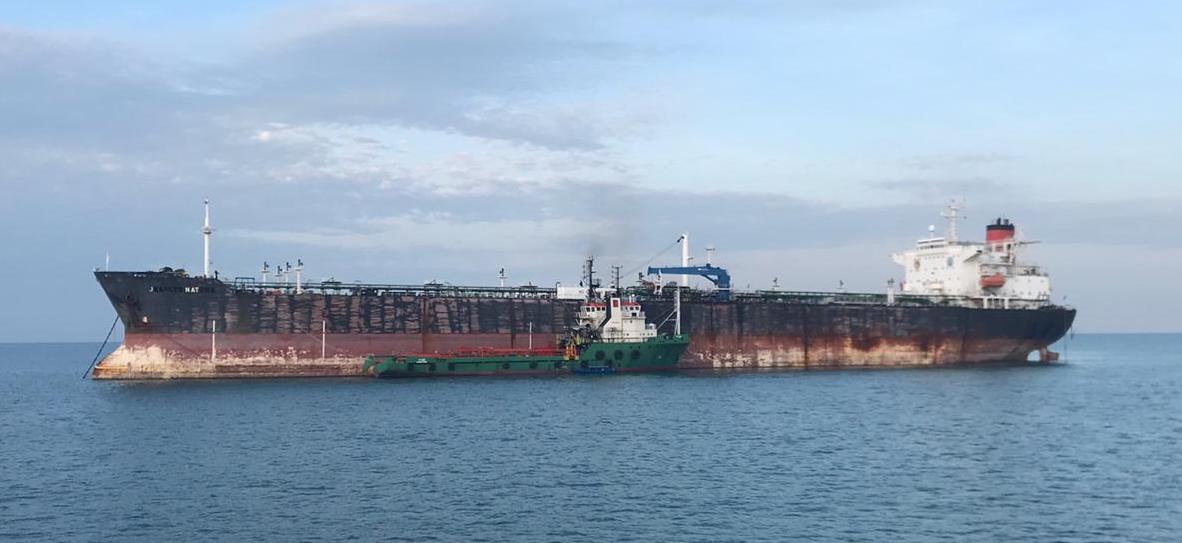Press Release – NGOs urge Bangladesh authorities to halt the import of a highly toxic offshore unit that illegally departed from Indonesia
The Floating Storage and Offloading (FSO) tanker J. NAT is currently being towed towards the infamous shipbreaking beach of Chattogram. The vessel, formerly known as JESSLYN NATUNA, operated in the Natuna gas field and was owned by Indonesian company Global Niaga Bersama PT. It was recently sold to cash buyer SOMAP International, who re-named it to J. NAT and re-flagged it to Palau. SOMAP is a company specialised in trading end-of-life vessels to the beaching yards.
The FSO J. NAT left Indonesian waters on 18 April even though local activists warned Indonesian authorities about the toxicity of the vessel. Official documents indicate that the tanker has more than 1500 tons of hazardous waste from the oil extraction process onboard, including 1000 tons of slop oil, 500 tons of oily water and 60 tons of sludge oil. Lab results on a sludge sample shared with the Platform reveal mercury levels of 395mg/kg. The J. NAT likely also contains high amounts of mercury in its structures, as well as in ballast waters.
The NGO Shipbreaking Platform, Basel Action Network (BAN), European Environmental Bureau (EEB), IPEN, Nexus3 Foundation and Zero Mercury Working Group have now warned Bangladesh of the breach of international waste laws [1], and urged authorities to halt the import of the contaminated ship. Ignoring illegal acts risks exposing the workers to severe harm and polluting the environment of Bangladesh.


Given the likely high concentrations of mercury in the steel hull of the FSO J. NAT and the blow torch method used to cut vessels, there is a high risk of inhalation of mercury vapour. Mercury is an extremely toxic metal. Exposure to mercury, even at low levels, has been linked to central nervous system damage, kidney and liver impairment, reproductive and developmental disorders, defects in foetuses and learning deficits.
In a recent court judgment on the illegal import of another oil and gas unit – Maersk’s FPSO NORTH SEA PRODUCER – the Bangladesh Supreme Court denounced the fraudulent documents claiming that the vessel was toxic-free when it in fact was contaminated by radioactive substances. The Court called for full transparency on the hazardous materials onboard end-of-life vessels imported to Bangladesh.

The Platform has documented drill ships, floating platforms, jack-up rigs and FPSOs/FSOs scrapped in recent years. Many were beached in South Asia, including units owned by Diamond Offshore, Maersk, Odebrecht, SAIPEM, SBM Offshore and Transocean. The J. NAT case resembles the recent export from Indonesia to the Indian beach of Alang of SBM’s mercury-laden tanker YETAGUN, which was investigated by Dutch media Zembla.

NOTE
[1] Bangladesh and Indonesia are both signatories to the Basel Convention on the Control of Transboundary Movements of Hazardous Waste and their Disposal. Under this Convention, the trade in mercury and several other hazardous wastes that are likely contained within the structure of the FSO J. NAT is strictly controlled. The import of the vessel requires that there is prior informed consent (PIC) between Indonesian and Bangladeshi authorities and that the declarations of hazardous materials left on board must reflect actual conditions. Moreover, the Convention requires that no export be made if there is reason to believe that the recycling or waste management facilities employed for the materials will not constitute environmentally sound management under the Convention. The shipbreaking yards that operate on the tidal beach of Chattogram are well-known for their dangerous and polluting practices.
Indonesia is also a party to the Minamata Convention, while Bangladesh has not ratified the treaty. Although the oil and gas sector is exempted from the international agreement in terms of their emissions management, countries must identify the potential sources of mercury emissions and releases within their own territory. Measures should be taken when high mercury sources have been identified.
UPDATE: This post was updated on 1 May 2020 to specify the levels of mercury contamination in the sludge of the FSO J. NAT according to lab results shared with the Platform.
Related news

Platform News – Latest report on ship recycling in Turkey presented in Izmir
Attending the event, representatives from local NGOs, unions and concerned citizens engaged in a constructive dialogue.
... Read More
Press Release – BBC exposes dirty and dangerous scrapping of oil and gas units in India
A BBC Disclosure production released this week reveals the harm caused by shipbreaking activities in Alang, India.
... Read More
Press Release – NGOs and trade unions denounce certification issued to PHP yard by classification society RINA
In October, the PHP Family (Peace Happiness and Prosperity) shipbreaking yard received a Statement of Compliance with the Hong Kong Convention [1] by the Italian classification society… Read More

Press Release – NGOs win FPSO North Sea Producer case
On 14 November the High Court Division of the Supreme Court of Bangladesh declared the import, beaching and breaking of the infamous FPSO North Sea Producer… Read More

Press Release – Worst corporate dumpers asked to clean up their acts
Targeting sustainability and fleet managers, the NGO Shipbreaking Platform calls for the adoption of responsible ship recycling policies in letters sent to shipping companies standing out for… Read More

Press Release – Turkish authorities ban the entrance of toxic aircraft carrier São Paulo
Turkey has finally banned the toxic aircraft carrier SÃO PAULO from entering its national waters.
... Read More

